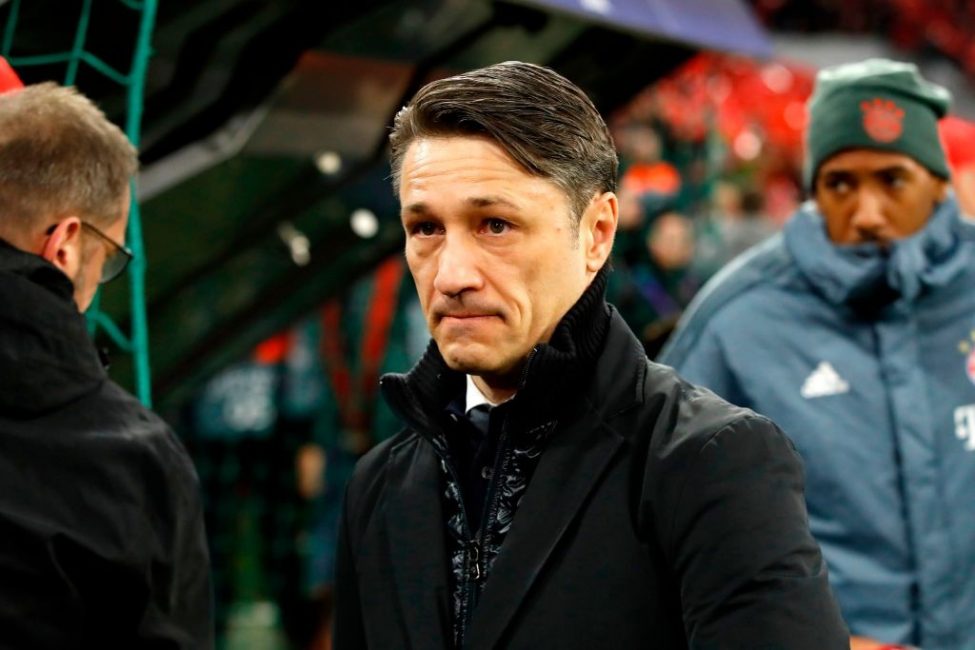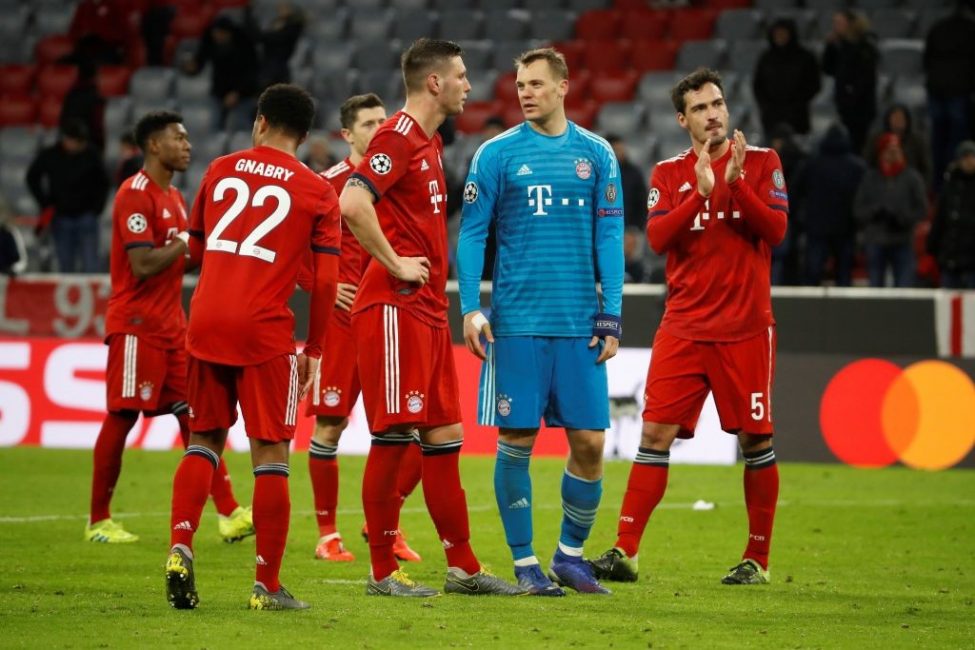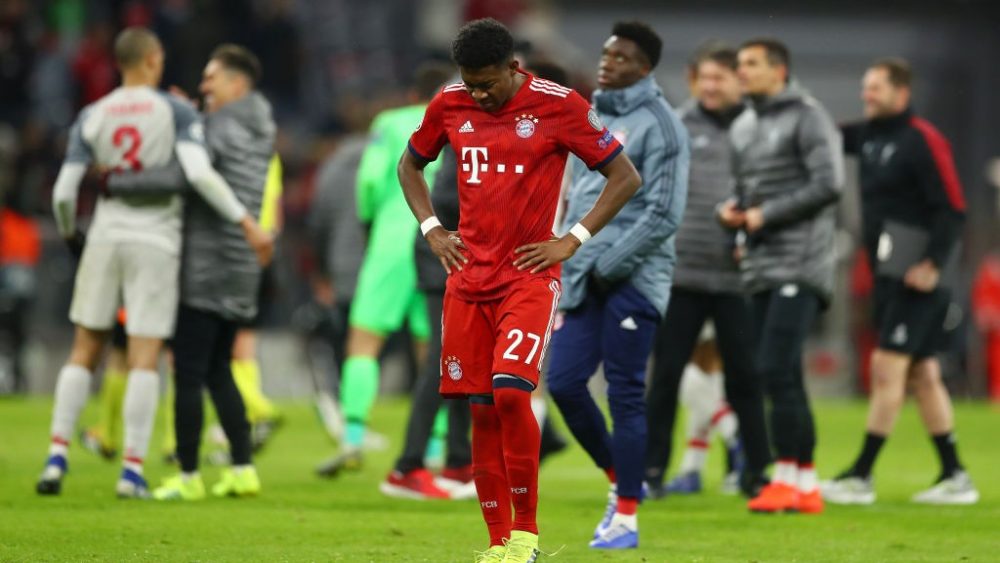The five stages of elimination
After the game I felt strangely deaf. Even though FC Bayern had failed to reach their big goal of winning the Champions League in the last few years, this time I felt different – somehow empty. Since then many different thoughts came and went and my emotional world turned several times, as if I was going through five stages of elimination.
1. Denial: But the first leg
The media response after the first leg at Anfield Road was overwhelming. The Spielverlagerung author Constantin Eckner “Why Bayern can be proud of the draw”. Julien Wolff even wrote “Why Kovac is the big winner at Bayern”. In retrospect I also let myself be blinded.
In comparison to the worst expectations directly after the draw, FC Bayern did indeed perform surprisingly well. While the fears in December even went as far as embarrassment (Kovač himself spoke of the “hardest draw”), Bayern fought their way to a draw against the then Premier League leaders.
But all that glitters is gold? The plan of Kovač for the difficult away game was simple: Don’t concede a goal. Right from the start, the Reds put the complete focus on the defence. They wanted to rob the opponent of their strength in counter attacks through compactness and protection.
And yet one must also say that Bayern was lucky in the first leg. Lucky Mané didn’t score a shot out of the turn. Lucky that Matip headed a corner ball past the goal. And lucky that Salah was one step too late for a long pass from Henderson.
In retrospect many things seem different and yet the optimism after the first leg from the retrospective was not appropriate. The weaknesses of the Munich team, namely lack of concentration in the defensive and gaps in the defensive set-up, were simply not punished this evening.
2. Disappointment: no plan, no fight
That brings us to the return leg and thus one of the weakest games of the Reds in the recent past. Today I went through the bigger defeats of the past years in my head to find similar weak games.
- Paris SG – FC Bayern 3:0, CL preliminary round 2017/18: The prestige duel for first place in group B of the Champions League went terribly wrong. In the last game under coach Ancelotti the Munich team showed a desolate performance and lost well deserved with 3:0. But in the end it was only a group game in which the job of the coach was at stake. With his choice of personnel – among others without Hummels, Boateng, Ribéry and Robben – Ancelotti finally lost the dressing room. His dismissal followed already the next day.
- VfL Wolfsburg – FC Bayern 4:1, Bundesliga 2014/15: In the first game after the winter break, Bayern was caught extremely cold and Wolfsburg, led by an outstanding Kevin de Bruyne, ran them off the field, especially in counter situations. The defense around Dante was completely overwhelmed and never seemed stable, while the attack without Ribéry did not show up.
- FC Barcelona – FC Bayern 4:0, CL quarter finals 2008/09: The mother of all defeats. An inexperienced Bayern team was completely crushed with coaching novice Klinsmann at Camp Nou. A demonstration of power and also a sign that the German champion was still missing a lot internationally.
- Zenit St. Petersburg – FC Bayern 4:0, UEFA Cup semi-final 2007/08: A defeat so devastating that for a long time there was even speculation about game manipulation. The dream of winning the UEFA Cup was suddenly destroyed in cold St Petersburg. To lose against a team from a supposedly second-rate league in this way showed the Reds their own limits with relentless openness.
- FC Bayern – Real Madrid 0:4, CL semi-final 2013/14: The first Guardiola season culminated in the duel against Spanish record holders Real Madrid in the semi-final of the Champions League. After losing the first leg 1-0, the second leg was to build on last year’s triple season. Probably at the insistence of the players, Pep switched to the previous year’s brilliant double six with Schweinsteiger and Martínez – a plan that went wrong. With two header goals from Ramos and two goals from Ronaldo, the Munich team experienced one of the darkest days in the club’s history.
There is still a difference between the bankruptcy in April 2014 and the elimination against Liverpool on Wednesday evening: Guardiola’s team seemed motivated to the tips of their hair. They wanted to show the whole of Europe that they could repeat last year’s success.
However, against Liverpool, the Reds seemed insecure from the very beginning. Insecure by the high pressing of the opponent. Insecure, because the match plan of Kovač forced them so much into defence.
After the 1:2 deficit no rebellion was visible. The team seemed broken. Almost the same team that had apparently regained the old ease before. Seven of the players had turned a 0:2 deficit against Turin in twenty minutes in spring 2016. Anything is possible in football – at that moment this saying seemed to be only known to a few people.
The plan of Kovač to not concede a goal again and to achieve one in the front through the individual class failed. Though also because for the repeated blunders of individual players that led to opposing goals. Mostly however, because rarely a Bayern team accepted the role of the underdog so much at home.

Odd Andersen/AFP/Getty Images
In a game in which Liverpool truly didn’t show any extraordinary performance or put on a revolutionary game plan, there was no chance. The reigning German champion was helpless – with the ball, but also without.
The dominance of the past days has long since vanished. FC Bayern has developed into a better individual copy of Eintracht Frankfurt under the coaching of Kovač. Against weaker opponents in a position to dominate the ball, one focuses in big games on one’ s defence and tries to score goals through counterattacks. But does this still reflect the self-image of FC Bayern?
3. Negotiate: The double is possible
Is everything bad now because of the first elimination in the round of sixteen of the Champions League since 2011? Basel, Arsenal, Arsenal again, Donetsk, Turin, Arsenal again, Besiktas. Liverpool was one of the most difficult opponents in the round of the last sixteen in a long time. Against the English runners-up you can lose.
And besides, it is now running reasonably well in the league. Thanks to several slips by Borussia Dortmund the team is back in first place. And in the Pokal the quarter finals are against Heidenheim, while the main competitor BVB is already eliminated. The double is possible. Other Bayern coaches had weaker first years.
Is everything bad right now? Maybe as a fan you have to be satisfied with smaller successes in a transitional season. To be in the semi-finals of the European Cup every year may also be a utopia of spoiled and complacent Bayern fans.
And yet the thoughts go back to the game. You can be eliminated against Liverpool. It is unacceptable to present yourself in such a way for 180 minutes.
The stats show 0.17 expected goals for Bayern in the second leg. In a game about death or gladiolas, the record champion rarely came dangerously in front of the opponent’s goal.
Rarely has a statistic so shocked and yet so accurately reflected reality.
4. Depression: What’s next?
The self-image of FC Bayern – I have already used this expression for the game under Kovač. But does the coach himself meet this requirement? Should the Croatian be part of the long-term solution for the Munich team and what does it look like? Do I trust the coach-novice to take the big step with the FCB? Rarely did this question arise more pressingly than today.
The FC Bayern season feels like in the mid 2000s. In the Bundesliga, the team plays in the top tier, the title seems achievable. The cup win is possible anyway. And in the European Cup you let yourself be surprised. Maybe you can annoy one of the big clubs on a weaker day. Is that the future of FC Bayern? And can that be the claim of a club that is in the top 5 of the Deloitte Money-League every year?

Odd Andersen/AFP/Getty Images
If you look at the line-up of the two teams yesterday, you can see that the Munich team has a maximum of three of the best eight players on the field. On an international level, the Munich squad is no longer extraordinary, but ordinary. Even with the announced transfer offensive, it is hard to believe that the Munich team will be able to catch up in quality.
Especially when you consider that the wallets of the competition are even deeper than the notorious banking account. The Bavarian transfer summer is an internationally common transfer period for most large clubs. For comparison: Liverpool spent 168 million and 182 million euros respectively in the last two summers.
Therefore it is more important for a team to create another advantage. Atlético Madrid have probably done the best in Europe in recent years in this respect, and in addition to their extreme counter-tactics they also rely on hard dual combat leadership and extreme willpower.
Can Kovač give FC Bayern this tactical advantage? The season so far seems to refute this. Although the Croatian has often put together a proper match plan before important matches, he missed to make important adjustments in the match.
If the responsible persons come to a similar conclusion in their seasonal analysis, the logical consequence would be to part with Kovač – no matter if you win the double or just another title.
However, it seems more important that the club has an overall plan. A playing idea, which is pursued independently of the coach in the first team and can be rolled out then also on the youth teams. A guideline both for the team and the staff. Such a concept would be exactly the fresh wind into the partly outdated operating structure of FC Bayern. A new mind like Oliver Kahn, who was discussed in the media as a member of the board.
5. Acceptance: No longer top internationally
Finally, the sobering conclusion can only be that FC Bayern has disappeared from the top group of European elite for the time being. The end against Liverpool is the end of an era, if you believe the German gazettes and bloggers.
The way back to the top will be a rocky one and while the whole expedition team as well as the leader are not fixed yet, some base camps are already set up. The mission does not start at sea level.
The generation Lahmsteiger, which our author Justin has aptly described in his book, may have finally come to an end on Wednesday against Liverpool, but a new generation is in the starting blocks. Kimmich, Thiago and Coman could become the cornerstones of this new era. Süle, Gnabry and Goretzka could become important helpers on the way back to the top.
It is important that Kimmich is not the new Lahm, Thiago is not the new Schweinsteiger and Coman is not the new Robben. FC Bayern’s new face will be a different one – and that’s a good thing.









